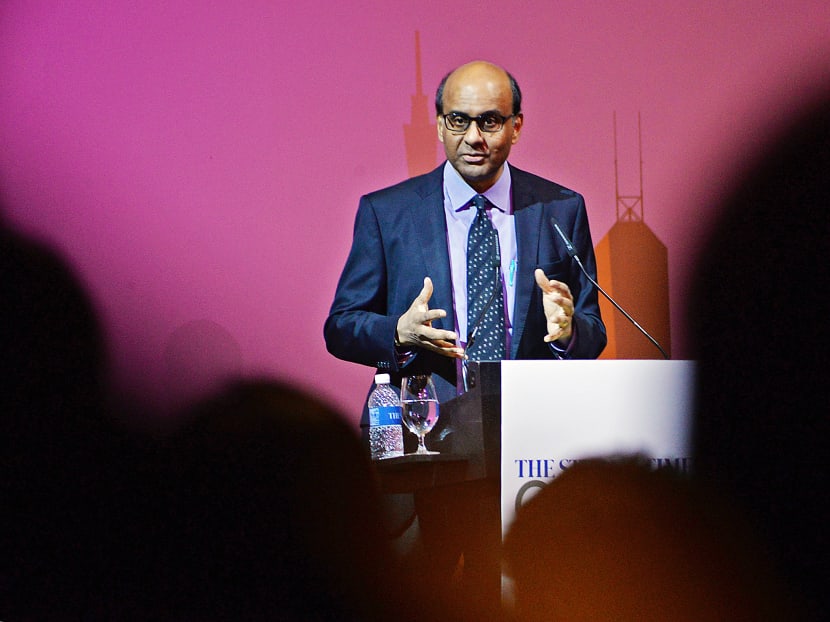What S’pore needs to thrive despite murky global outlook
SINGAPORE — Faced with short-term challenges such as weakening electronic exports and longer-term structural issues like slowing labour force growth, Deputy Prime Minister Tharman Shanmugaratnam reiterated the importance of productivity-driven growth.

DPM Tharman detailed the ‘new phase of global affairs’, and how Singapore can best the challenges that come with it, at the Straits Times Global Outlook Forum 2015. Photo: Robin Choo/TODAY
SINGAPORE — Painting a grim picture of a future marked by more volatility and uncertainty, Deputy Prime Minister Tharman Shanmugataram warned of slower overall growth owing to structural and demographic changes faced by the United States and China. But there will still be opportunities for Singapore to capitalise on, provided the Republic continues to be innovative and productive.
Describing “a new phase of global affairs”, Mr Tharman, who is also Coordinating Minister for Economic and Social Policies, said this new phase will be marked by slower growth overall, “especially because of the changing demographics...slower growth in trade, especially because of the evolution of (the) Chinese economy … (and) continuing tensions for (a) long time to come, coming out from sectarian conflicts, which are now globalised.”
And policy-making in this phase has become even more complex as economies see “a confluence of both cyclical and structural factors”, added Mr Tharman in his keynote speech at The Straits Times Global Outlook Forum today (Nov 20), where he also took questions on topics such as terrorism, the South China Sea disputes and social policies. The Straits Times Global Outlook Forum discusses geopolitics and other issues affecting Asia.
Citing the US as an example, Mr Tharman said the spotlight may be on the closely watched interest rates hikes, which are “essentially about managing the cyclical” such as labour market recovery or risks of rising inflation, but federal policy does not determine the fundamentals.
“If you look at it over the last few years, I think it has to be said that monetary policies have not been very effective (in) stimulating recovery, and (they’re) particularly not the right tool for getting sustainable growth,” he said.
At the same time, the US economy also has to struggle with serious structural problems such as stagnant wages and a severe shortage of medium- and upper-level skills. Mr Tharman said employers in the US are unable to find people with the right skills, such as nursing specialists or skilled technicians, which is a common feature in other advanced economies.
He also warned of looming pensions and healthcare financing crises, as economies are currently unable to pay for commitments which have been made to voters.
“The burden will have to fall on the younger workforce through higher taxes. Or, there will have to be some very harsh decisions to cut commitments, which few politicians are willing to do because this is cutting commitments from older voters, who are an extremely important bloc in mature democracies,” he said.
China is likewise juggling cyclical problems such as excessive corporate debt, as well as longer-term structural shifts in the nature of its economy towards growth driven by consumption and services instead of just manufacturing, noted Mr Tharman.
“What has been less noticed and is also a very important structural shift in the Chinese economy is in manufacturing itself…There used to be a global supply chain that China was part of...and whatever China made you find inputs coming from a whole range of countries. But China is now producing more of those inputs themselves...That shift is having quite significant effects around the world,” he said.
But even with a slowdown in the global economy, Mr Tharman said there will be “no lack of opportunities … (for) players who are innovative, individuals who are skilled and teams that bring the right skills together”.
For an economy to be driven by innovation, people would have to be equipped with the right skills and lifelong learning through initiatives such as SkillsFuture.
“Up and down the (career) ladder, across all types of jobs... We have to equip people with the skills that enable them to work in a technology-enriched world, so that we preserve jobs and so that jobs get better,” he said.
Singapore would also have to crack the current “dual economy”, where larger firms are more productive while others like some in construction are weaker, and diffuse technological advancements throughout the economy, said Mr Tharman.
Singapore also needs to aspire towards a culture that values and respect skills mastery.
Citing Germany and Sweden as examples, Mr Tharman said: “When you look at why they are world leaders, you’ll find people working in enterprise who have deep mastery of skills, not because they were highly educated when they were young, but (because) they were developed through life and become masters of what they are doing.”






